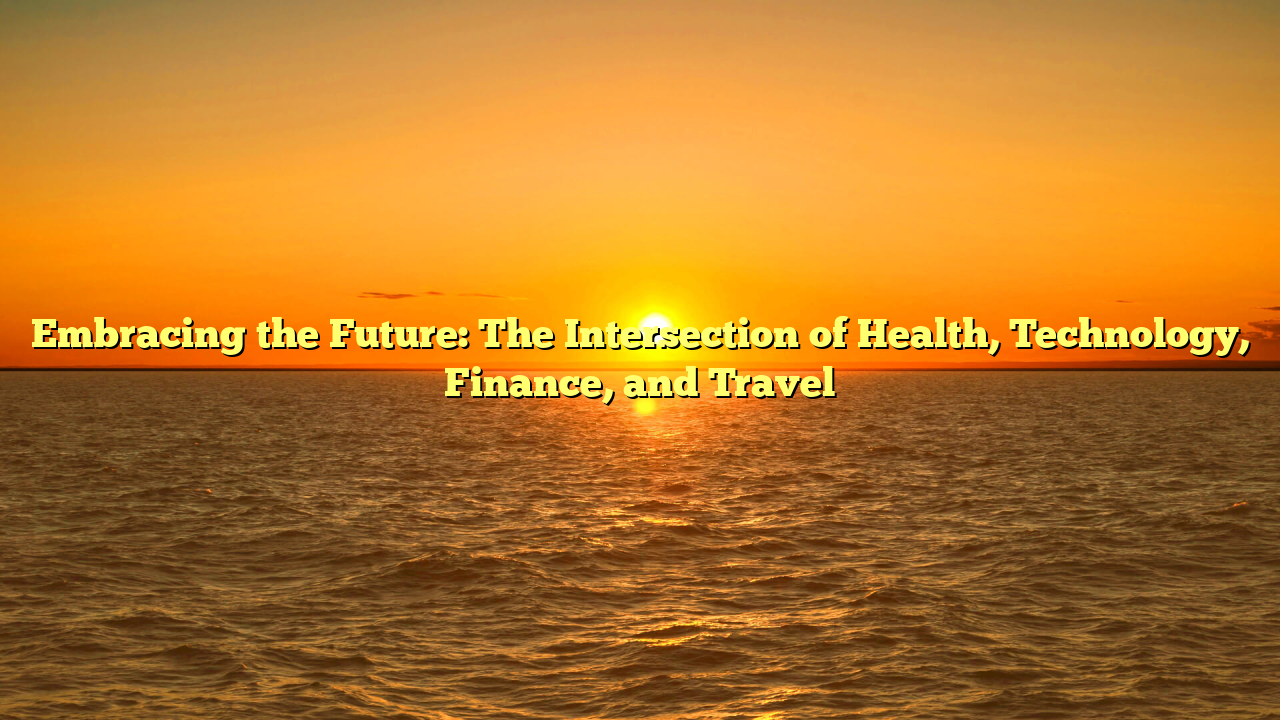In today’s fast-paced world, wellness has become an integral part of our daily lives. With technological advancements rapidly evolving, we are witnessing major transformations in multiple sectors, including medicine, investment, and travel. These changes have not only improved our quality of life but also opened new possibilities and avenues for growth and exploration. This article explores the convergence of these fields and the impact they have on our daily lives, creating an interconnected ecosystem where the future of wellness, innovation, economics, and adventure is more intertwined than ever before.
Health: Technology Revolutionizing Wellness
Health has always been a top priority for individuals worldwide. toko56 in innovation have paved the way for a more personalized and efficient approach to healthcare. Fitness trackers, such as smartwatches, allow individuals to track their fitness activities and even monitor vital signs like heart rate, blood pressure, and oxygen saturation. These innovations have empowered individuals to take charge of their health, providing real-time data that aids in early diagnosis and preventive care.
Telemedicine is another aspect of modern healthcare that has gained prominence in recent years. With the advent of high-speed internet and video conferencing tools, patients can now consult with doctors remotely, reducing the need for in-person visits. This is especially beneficial for those in rural areas or those with mobility issues. Additionally, artificial intelligence (AI) has been a game-changer in diagnosing and treating diseases, with algorithms capable of analyzing medical images, predicting potential risks, and even recommending personalized treatment plans.
However, the integration of technology into healthcare has raised concerns about data privacy and security. As health data is increasingly stored and shared digitally, ensuring that sensitive information is protected has become a critical issue. Building secure and encrypted systems will be essential to maintain patient trust and confidentiality in the future.
Technology: The Driving Force Behind Innovation
Innovation has been at the forefront of shaping our lives in the modern age. From artificial intelligence to cryptocurrency, the impact of technology is profound and pervasive across various industries. AI, for example, is transforming industries like medicine, banking, and transportation. In the healthcare sector, AI is being used to analyze patient data, predict health outcomes, and even assist in surgeries.
In finance, technology has completely reshaped how we manage and spend money. The rise of digital banking, mobile payment apps, and cryptocurrencies like Bitcoin has changed the way we think about money. Decentralized finance (DeFi) platforms have democratized access to financial services, allowing individuals to engage in lending, borrowing, and trading without relying on traditional banks.
The travel industry has also seen significant changes thanks to technological advancements. Online travel agencies (OTAs) and platforms like Airbnb have revolutionized the way we plan and book trips. Virtual reality (VR) and augmented reality (AR) are enhancing the travel experience, enabling users to explore destinations virtually before booking their trips. Moreover, AI-powered recommendation systems have personalized travel suggestions based on user preferences, making the entire process more seamless and tailored.
However, the rapid pace of technological change also brings challenges. The digital divide, where some populations have limited access to technology, is one such issue. Bridging this gap will be crucial to ensuring equitable access to the benefits of technological advancements.
Finance: Managing Wealth in a Digital World
Financial management has undergone a significant transformation in recent years, driven largely by technology. The traditional financial sector, once dominated by physical banks and brokers, has shifted towards digital solutions. Online banking and fintech companies have made it easier for individuals to manage their finances, whether it’s checking their balances, transferring funds, or investing in stocks.
Cryptocurrency has emerged as a major disruptor in the financial sector. With digital currencies like Bitcoin, Ethereum, and others, people now have the ability to invest, trade, and store value in ways that were once not possible. Blockchain technology, the backbone of cryptocurrencies, has created a secure and transparent method of conducting transactions without the need for intermediaries.
For individuals, investing has become more accessible than ever. Online platforms such as robo-advisors use algorithms to manage investments, providing low-cost, automated wealth management services. Furthermore, the rise of social trading platforms allows users to copy the trades of experienced investors, democratizing access to the stock market.
Despite these advancements, the financial world faces challenges. The rise of digital finance has led to concerns about financial security, with cyberattacks becoming more frequent. Ensuring that financial systems are secure and resilient in the face of these threats will be a critical aspect of the future of finance.
Travel: Exploring the World with Technology
The travel industry has always been a major player in the global economy, and with the integration of technology, it continues to evolve at an incredible pace. The traditional methods of booking travel, such as visiting a travel agent or calling hotels directly, have been replaced by online booking platforms, which have simplified the process for consumers.
Moreover, technology has made travel more personalized and immersive. The use of AI in travel has allowed for more tailored experiences, such as recommending destinations based on preferences or offering personalized itineraries. Smart travel devices, like luggage with built-in GPS and smart locks, are making travel more convenient and secure.
One of the most exciting developments in travel is the rise of sustainable tourism. With the help of technology, travelers can now make more environmentally conscious decisions, from booking eco-friendly accommodations to using apps that calculate the carbon footprint of their travel. Additionally, many airlines and travel companies are investing in greener technologies, such as electric planes and sustainable fuel options, to reduce the environmental impact of travel.
However, the travel industry faces its own set of challenges. The COVID-19 pandemic has had a profound effect on global tourism, and as the industry recovers, there are concerns about the future of travel safety and public health. The implementation of health passports, vaccination certificates, and AI-powered systems for crowd management are all steps in the right direction toward ensuring safer travel experiences.
Conclusion: A Bright Future Ahead
As we look to the future, it’s clear that the intersection of health, technology, finance, and travel will continue to evolve and shape our world. Technology will remain the driving force behind these transformations, providing innovative solutions to improve our lives and open up new opportunities. Whether it’s through wearable health tech, digital finance tools, or personalized travel experiences, these fields are increasingly becoming interconnected.
While challenges such as security, data privacy, and accessibility remain, the future is bright for those who embrace these changes. By harnessing the power of technology, we can create a more efficient, sustainable, and enjoyable world where health, finance, and travel are more accessible than ever before.
Embracing the Future: The Intersection of Health, Technology, Finance, and Travel


